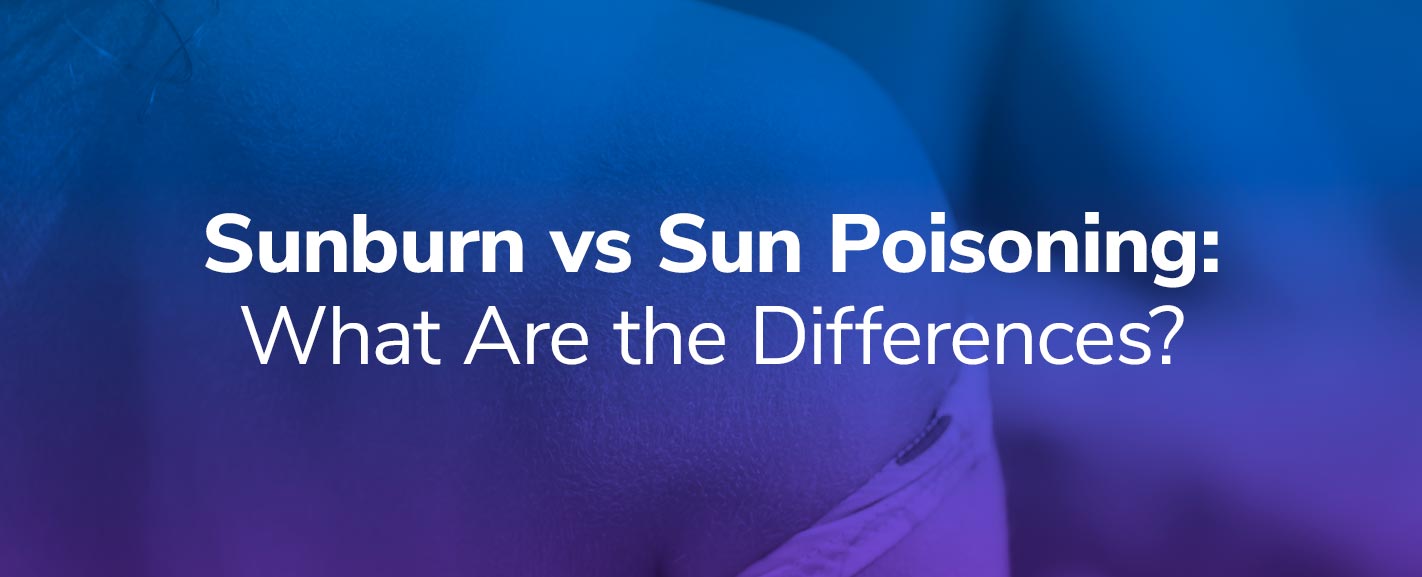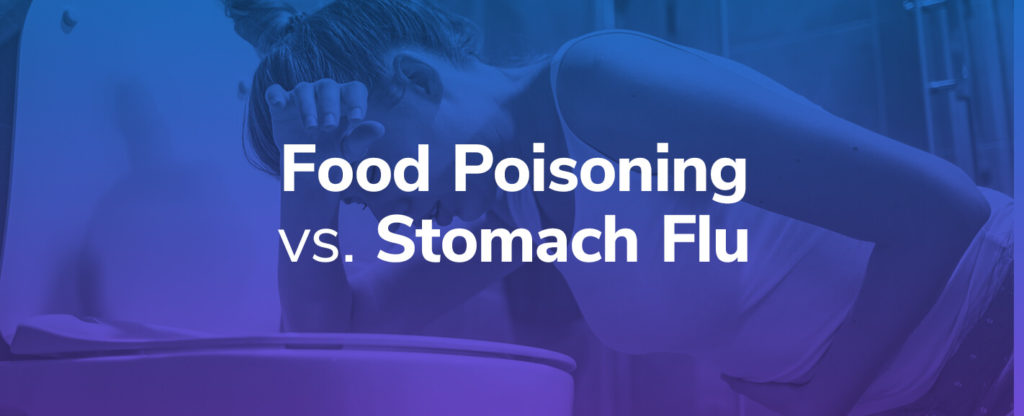Spending time out in the sun can offer many benefits, such as improved mood and better sleep. Still, sometimes we might use the wrong protection or stay out longer than we should, leading to sunburn or even sun poisoning. These conditions can be harmful to your skin and eventually become life-threatening — it’s important to know what causes them, how they differ and the various ways you can prevent them.
With the right information, you can spend time outside in the sun safely, without having to worry about damage to your skin.
- What Is Sunburn?
- What Is Sun Poisoning?
- Understanding Your Risk of Sunburn
- How to Treat a Sunburn
- Preventing Sunburn
- Suffering From Sunburn?
What Is Sunburn?
Sunburn is skin that has turned red and hot to the touch due to overexposure to UV rays. If you’ve ever taken a beach day and fallen asleep in a chair for a few hours, you’ve likely experienced the effects of sunburn. You might not even notice you’ve been burned until hours later when you may feel spreading pain and tightening on your skin or see redness in the mirror. These are the characteristic signs you’ve suffered sunburn.
When your body is exposed to the sun, it produces melanin — the dark pigment in the outer layer of skin. That extra melanin creates a tan to defend against sunburn. This protection will only last so long, however, before UV rays penetrate and cause more severe burns.
Any part of your body that gets exposure to the sun can burn. It’s a good idea to wear hats or clothing that protects your skin from the sun if you usually tend to burn. Clothing that is loose or has gaps can allow UV light to shine through and cause burns. Even small areas like your ears, lips and eyes can burn. You can even burn on cloudy days, as UV rays still penetrate through clouds.
After a few days, your body will likely seek to repair itself by peeling off that burnt layer of skin. Peeling is a normal part of the sunburn healing process and means your body is trying to replace the damaged skin. It’s important to let your skin heal naturally rather than trying to peel it off yourself.
Aside from being uncomfortable and painful, sunburn can negatively affect your health. Mainly, it can cause premature skin aging, leading to wrinkles, weakening of connective tissues and dry, rough skin. It may also lead to skin cancer.
Sunburn usually won’t be as bad as sun poisoning — make sure you know the differences between sun poisoning vs. sunburn.
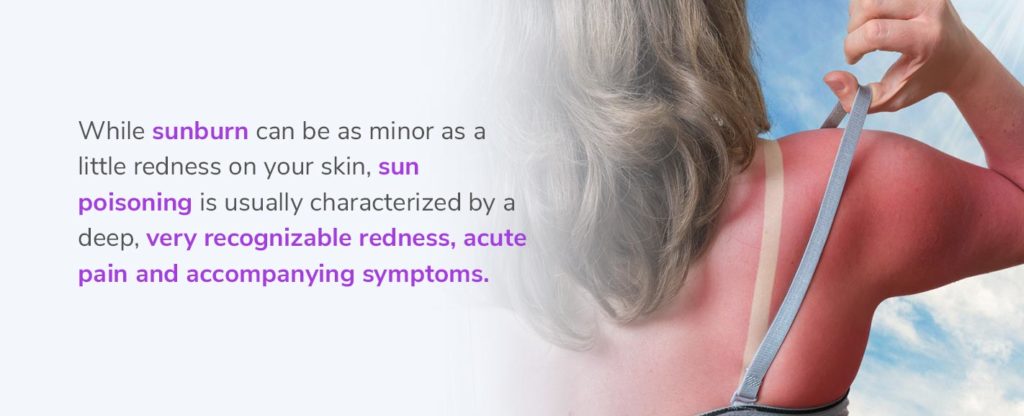
What Is Sun Poisoning?
Sun poisoning is a severe type of sunburn — when you spend too much time out in the sun without proper protection, UV rays can cause severe burns on your skin, leading to inflamed redness and other sun poisoning symptoms, such as:
- Blisters
- Swelling
- Headache
- Tingling pain
- Fever and chills
- Nausea
- Dizziness
These symptoms may not present themselves until after the damage is already done — like sunburn, you might not notice you’ve been burnt badly until hours later. If you have lighter skin and hair, you’ll likely burn much quicker — sunburn can happen in as little as 15 minutes out in the sun.
The main difference between sunburn and sun poisoning is the level of severity. While sunburn can be as minor as a little redness on your skin, sun poisoning is usually characterized by a deep, very recognizable redness, acute pain and accompanying symptoms. Sun poisoning will mean that you’ve spent a lot of time out of the sun, leading to a loss of fluids and dehydration.
A sun poisoning rash can be very painful and uncomfortable. If you suspect you or someone else has sun poisoning, it’s important to seek medical care right away, as this condition can be very dangerous.
Understanding Your Risk of Sunburn
Anyone can get burnt from the sun, so it’s important to take the proper precautions and know whether you have a tendency to burn. Everyone has their own unique situation and factors that will determine how their body reacts to UV rays. Be sure that you’re paying attention to a few key factors that will determine how easily you burn:
- Skin type: Those with lighter skin will burn easily, as their skin doesn’t have as much protection from UV rays. If you have lighter skin, be sure that you’re taking extra precautions when you’re out in the sun. Even individuals with darker skin tones can suffer sunburn and the accompanying risks of sun exposure.
- History of sunburn: You’ll likely remember if you got a bad sunburn at some point in the past. Try to think back and see if you’ve had multiple burns — this could be a sign that you burn very easily.
- Family history: If you have family members that easily burn, then it could be a part of your genetic makeup. Ask around to see how others in your family react to UV rays.
- Medications: Some medications may affect your immune system, and in turn, how your body protects itself from UV rays.
- Location: Your setting will also dictate how easily you burn. If you live in an area that sees frequent and intense sunshine, or you’re vacationing in an area with a lot of sun, your risk of sunburn will go up.
Check out those various factors to see where you stand when it comes to sunburn risk. Knowing how easily you burn is one of the best ways to defend against it — with the right information, you’ll be able to take the precautions you need to protect your skin.
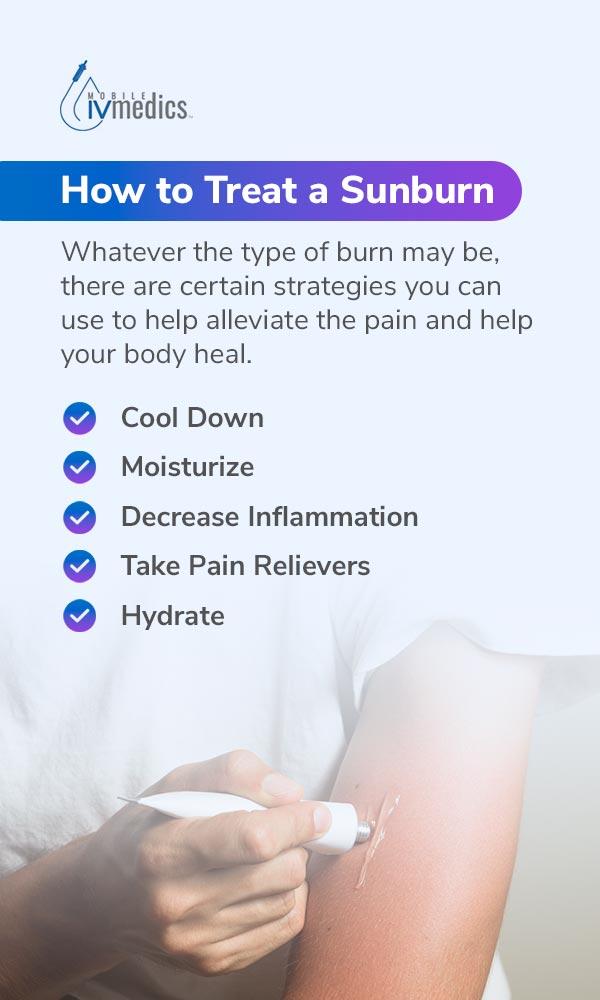
How to Treat a Sunburn
Sometimes, even with the right precautions, you may make the mistake of staying out in the sun a little too long, leading to sunburn. This could be something as simple as a slight redness to a painful, blistering burn. Whatever the type of burn may be, there are certain strategies you can use to help alleviate the pain and help your body heal.
Cool Down
One of the best things you can do for a sunburn is to cool down your skin — even after you get out of the sun, that hot, burning feeling can stay with you. To cool yourself down, try taking a cool shower or bath to help ease some of that burning sensation. Cool water can help alleviate some of the pain.
You may want to avoid taking steaming showers, as this can be painful on your burned skin. You could also do a cold compress by soaking a clean towel or sponge in cold water and placing it gently on your skin.
Moisturize
Apply moisturizer generously to the burnt area of your skin. This will help soothe that burn and decrease any lingering pain. Moisturizers containing aloe vera can be very effective in easing the symptoms of sunburn and sun poisoning. You can also use pure aloe vera straight from the plant or a store-bought gel with pure aloe vera.
Be sure you’re applying lotion gently and frequently, even as your skin begins to look healed.
Decrease Inflammation
Sunburns can cause a lot of painful inflammation in the skin. Cool compresses, moisturizing and staying out of the sunlight will help ease this inflammation. For the most part, it will also just take some time for your burn to fade and start to peel. It may take up to a few days or a week, so make sure you continue to take care of your skin, even after it starts to peel.
Take Pain Relievers
Over-the-counter pain relievers can give you some much-needed respite from the burning sensations of sunburn. They also help reduce swelling and inflammation and will help you get some rest so your body can heal properly.
Hydrate
Sunburn and sun poisoning aren’t just harmful to your skin — they’re usually harmful to your whole body, draining you of critical nutrients. When you’re out in the sun, be sure you’re drinking a lot of water and replacing your fluids. Electrolytes are especially important because they help transfer essential nutrients into your cells.
Sometimes, drinking water isn’t enough to fend off dehydration. There are quicker, easier hydration methods that can help you replace your fluids with enriching vitamins and minerals. An option like IV therapy is a great, modern solution to sunburn — it can hydrate you effectively and efficiently, boosting your health and ensuring that you’re properly hydrated.
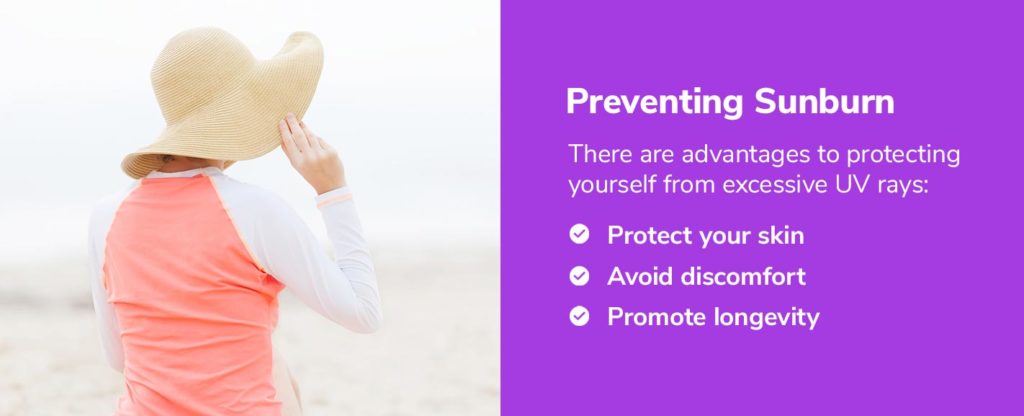
Preventing Sunburn
If you’re planning a beach day, there are ways you can prepare yourself for a day out in the sun. Although getting a moderate amount of sun can offer a lot of benefits, there are also advantages to protecting yourself from excessive UV rays:
- Protect your skin: The most obvious benefit of preventing sunburn is that you’ll be protecting your skin. Sunburn is very damaging to your body, causing it to peel off and be replaced with an entirely new layer of skin. With the right protection, you can avoid this uncomfortable process, avoiding any blistering, peeling and pain caused by too much sun.
- Avoid discomfort: Sunburn and sun poisoning can be very painful. It can affect how you sleep and be uncomfortable in day-to-day life. With a little bit of strategy on how not to get burnt, you can avoid days of discomfort.
- Promote longevity: Preparing for sunshine is also a way to promote longevity. Sunburn can lead to wrinkles, freckles, sun spots and even skin cancer. Take some precautions so that you can have healthy, lasting skin far into the future.
As you can see, there are a lot of reasons you should protect yourself before spending some time out in the sun. Knowing these benefits, you may want to take some time to learn about some strategies that can defend against sun damage.
Wear and Reapply Sunscreen
One of the best ways to protect your skin from burning is by using sunscreen. Apply sunscreen to any part of your body that is exposed to the sun — even in small areas. Applying sunscreen is a good daily practice, so it’s important to find a brand that nourishes your skin. Some foundations have built-in sunscreen so you can enjoy protection even with makeup on.
Make sure you also check the sun protection factor (SPF) of your sunscreen — for those with lighter skin, you may want to opt for stronger, long-lasting protection that comes with higher SPFs. Also, be sure to consistently reapply sunscreen throughout the day so that you can ensure you have the most protection possible. If you’re planning on swimming, look for a water-resistant sunscreen.
Cover Up
While sunscreen can help defend against the sun, you could also benefit from covering up your skin. This could simply mean wearing a shirt while you’re at the beach to make sure you have an extra layer to protect you from the sun. Sunglasses can be a great way to defend against the sun, too — your eyes themselves can actually burn from the sun, causing problems with your eyesight.
Hats and shoes are another great way to provide some cover for your skin. The more likely you are to get burnt, the more you should try to cover up your skin to avoid severe burns.
Stay in the Shade
If there’s shade around, try to stay under it. While a little bit of time in the sun can be great, you should be seeking out those spots of shade so that you can get out of direct sunlight and cool off. If you know you’ll be in an area that won’t have a lot of shade, consider bringing an umbrella so that you can create an area where you’ll be safe from the sun.
Check the Weather
Before you head out into the bright sunshine, make sure you’re checking the weather. Is it going to be sunny all day or are you going to get some cloud cover? You can even check how intense the sun is going to be with the UV index. A UV index predicts ultraviolet radiation levels on a scale from one to eleven, with one being the lowest and eleven being the highest. Here’s a brief rundown of the scale:
- <2: UV radiation exposure is minimal. You should be able to safely be outside without too much concern about burning.
- 3 to 5: Exposure is moderate — you should start to take precautions to defend yourself from direct sunlight.
- 6 to 7: The UV radiation is high — seek out shade, wear clothes and use sunscreen to avoid sunburn.
- 8 to 10: Try to stay out of the sunshine during midday hours. Wear a hat, sunglasses and sunscreen at all times outside.
- 11+: UV radiation is extremely high — avoid being out in the sunshine.
Checking the UV index can be a great indicator of how likely you are to get burned. If the UV index is high and you’re prone to burning, you might want to consider taking extra precautions. On the other hand, if the UV index is particularly low, you can gain some more confidence about spending some time out in the sun.
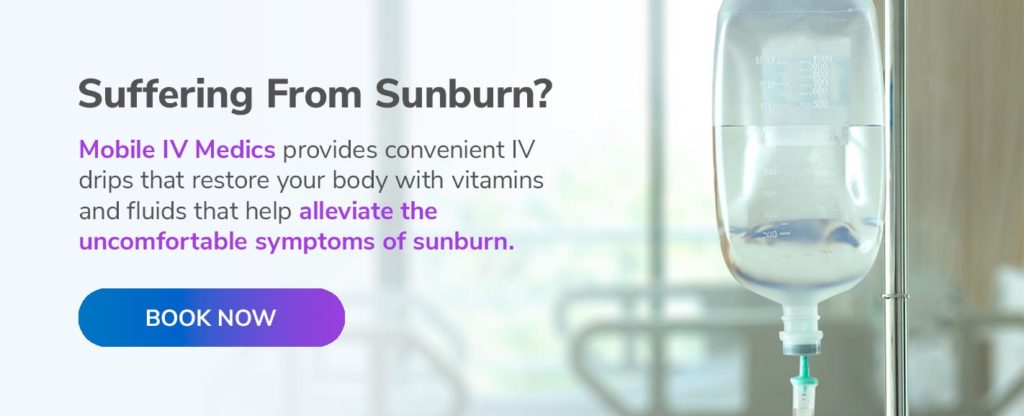
Suffering From Sunburn?
Even when taking the right precautions, you can still suffer from sunburn. Though you might not notice it at the time, you could begin to start feeling the aftereffects of sunburn a few hours later — redness of the skin, burning sensations and blistering. A lot of the accompanying symptoms of sunburn are caused by dehydration — vital fluids in your body have been drained.
To gain those fluids back, you can choose an innovative solution — IV therapy. Mobile IV Medics provides convenient IV drips that restore your body with vitamins and fluids that help alleviate the uncomfortable symptoms of sunburn. The process is simple — just contact us and we’ll send out a professional to assess your needs so you can get back to feeling like yourself.
Schedule a booking today!
